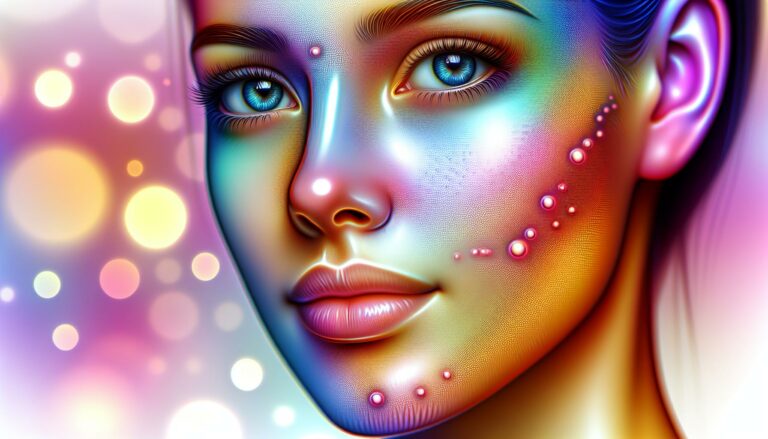Do Eggs Cause Acne?
Could your morning omelette be to blame for those unwanted breakouts?
The relationship between our diet and skin health is complex, and eggs, a staple in many breakfast menus, have sparked debates regarding their role in acne development.
Despite their nutritional value, there’s a growing curiosity about whether eggs could be contributing to skin issues for some individuals. Understanding this potential link is crucial for anyone on the quest for clear skin.
Well, we’ll be going over:
- How do the nutrients in eggs interact with our body’s systems, potentially influencing acne?
- Is there scientific evidence supporting the claim that eggs can exacerbate or cause acne?
- What steps can you take to determine if eggs are impacting your skin health, and how can you adjust your diet accordingly?
Let’s dive in.

The Connection Between Diet and Acne
Understanding the link between what you eat and your skin’s health is essential. Research has revealed that certain dietary elements might trigger or worsen acne due to their effects on inflammation, hormonal balance, and skin cell production.
Dairy products and high-glycemic foods, such as sugary snacks and white bread, are known culprits. They cause blood sugar spikes, leading to increased insulin levels that can boost the production of oils and contribute to clogged pores. On the other hand, foods high in antioxidants, omega-3 fatty acids, and vitamins can promote skin health and potentially reduce the occurrence of acne.
Eggs, with their complex nutritional profile, sit in a gray area. While they’re packed with protein and beneficial nutrients, some theories suggest they might affect acne due to biotin content or hormonal impacts in susceptible individuals. It’s crucial to monitor how your body responds to eggs and adjust your diet accordingly.
Examining the Nutritional Value of Eggs
Eggs are a powerhouse of nutrition, offering a range of vitamins and minerals essential for overall health and potentially impacting skin condition. At the heart of their benefits, eggs provide high-quality protein, crucial for repairing skin cells and maintaining a youthful complexion. They’re loaded with vitamins A, D, and E, which are known for their skin-healing properties and ability to improve skin health.
However, it’s the biotin content in eggs that draws specific attention when discussing acne. Biotin, or vitamin B7, supports skin, hair, and nail health, but excessive amounts may lead to skin issues for some individuals. Understanding the balance is key.
Additionally, eggs contain omega-3 fatty acids which aid in reducing inflammation, a significant factor in acne flare-ups. This nutritional profile suggests eggs can be beneficial for your skin, yet the reaction varies from person to person. Paying attention to how your skin responds to consuming eggs is vital for tailoring your diet for optimal skin health.
Debunking the Myth: Eggs as a Cause of Acne
The myth that eggs directly cause acne has been a topic of much debate. It’s crucial to understand that acne development is multifactorial, involving genetics, hormones, and lifestyle factors. When it comes to diet, the relationship isn’t black and white. While certain foods might trigger flare-ups in some individuals, others may not experience the same effects.
Eggs, in particular, have been under the microscope due to their diverse nutritional profile. It’s important to note that eggs contain vital nutrients that support skin health, including omega-3 fatty acids, vitamins A and E, and antioxidants. These compounds are known for their anti-inflammatory properties and their role in promoting a healthy skin barrier.
Studies aiming to pinpoint a direct link between egg consumption and acne are limited. Most current research suggests that rather than eggs being a singular cause, it’s the overall dietary patterns and individual sensitivities that play a significant role in acne development. For those concerned about eggs and acne, paying attention to your body’s response after consuming eggs is key. Adjusting your diet based on personal observations rather than sweeping dietary eliminations can be a more balanced approach to managing acne.
Understanding the Potential Link Between Eggs and Acne
When diving deeper into the relationship between eggs and acne, it’s essential to understand the complexity of this connection. Eggs are a powerhouse of nutrition, offering high-quality protein, vitamins A, D, E, and B-complex, and essential fatty acids. These nutrients are pivotal for maintaining healthy skin by supporting skin cell renewal, reducing inflammation, and bolstering the skin’s defense against environmental damage.
However, the potential link between eggs and acne primarily lies in how your body reacts to certain components within eggs. For some individuals, the biotin (vitamin B7) found in eggs, while crucial for skin, hair, and nail health, might contribute to breakouts if consumed in high amounts. Biotin can affect the skin’s production of sebum, leading to increased oiliness in some cases.
Moreover, dietary habits that include high consumption of eggs might inadvertently lead to hormonal imbalances. These imbalances can trigger overproduction of sebum, clogging pores, and eventually, acne. It’s crucial to monitor how your body responds to eggs, as individual reactions can vary widely.
Observing your skin’s condition after incorporating or eliminating eggs from your diet can provide valuable insights. Adjusting your diet based on your observations, rather than following blanket dietary advice, can be more effective in managing acne.
Making Informed Dietary Choices for Clearer Skin
Understanding the impact of what you eat on your skin’s health is key to achieving a clearer complexion. If eggs have been part of your diet and you’re experiencing acne, it’s worth exploring how your body reacts to them. Skin reactions can vary greatly from one individual to another, suggesting that the link between diet and skin health is highly personal.
To determine if eggs are affecting your skin, consider conducting a dietary experiment. Eliminate eggs from your diet for a few weeks and observe any changes in your skin condition. During this period, it’s crucial to maintain a balanced diet, ensuring you’re getting essential nutrients from other sources. Foods rich in omega-3 fatty acids, antioxidants, and vitamins can support skin health. Some great alternatives include:
- Leafy greens
- Nuts and seeds
- Berries
- Fatty fish like salmon
Monitoring your skin’s reaction to dietary changes can provide valuable insights. If you notice an improvement, it may suggest a sensitivity to certain components in eggs. However, it’s also possible that other factors are at play. Keeping a food and skin journal during this time can help you identify patterns and make more informed choices about your diet in relation to your skin health.
Conclusion
Understanding the link between what you eat and your skin health is crucial. While eggs offer numerous benefits, they might not suit everyone. If you suspect eggs are triggering your acne, taking a break from them could provide clarity.
Remember, maintaining a balanced diet is key during this period. By closely monitoring your skin and possibly keeping a journal, you’ll gain insights into how your diet affects your complexion. Making informed dietary choices is a step towards achieving clearer, healthier skin.






